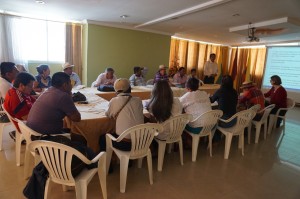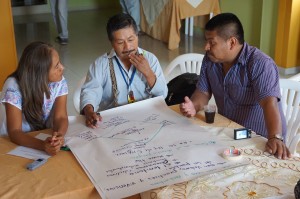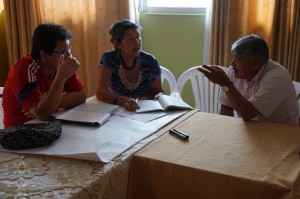Engaged Anthropology Grant: Sandra Brunnegger

Dr. Sandra Brunnegger is a Fellow in Law and Anthropology at St. Edmund’s College – University of Cambridge. In 2009 she received a Post-Ph.D. Research Grant, to aid research on “Culture and Human Rights in Colombia: Negotiating Indigenous Law”. In 2015 Dr. Brunnegger received an Engaged Anthropology Grant to aid engaged activities on “Engaging with Indigenous Legal Systems in Colombia”.
I organized a one-day workshop on indigenous legal systems in Ibagué in Colombia with the support of the indigenous organization CRIT (Consejo Regional Indígena del Tolima or Regional Indigenous Council of Tolima). Leaders from the ACIN (Asociación de Cabildos Indígenas del Norte del Cauca or Association of Indigenous Cabildos of Northern Cauca) and CRIT, community members, asesores (advisers), lawyers and NGO workers attended. These workshop participants represent some of the personal contacts I have forged during my long-term multi-sited fieldwork on the tribunal established by CRIT in Tolima and the Escuela de Derecho Propio Cristóbal Secué (Cristóbal Secué School of Own Laws) initiated by ACIN in Cauca. These two institutions, the tribunal and the law school, are two examples of the many social, political and legal transformations that the constitutional recognition of indigenous legal systems in 1991 has brought about in Colombia. The law school is currently not operating. In a concurrent effort, a law program at the Universidad Autónoma Indígena Intercultural (UAIIN, Autonomous Intercultural Indigenous University) in Popayán, Cauca, has been drawn up and it is headed by a former graduate of ACIN’s law school.

The day before the workshop officially started I was sitting with some leaders whom I have worked together with over a decade. We sat over dinner and talked over recent political events, local occurrences and difficulties. Our rich conversations and engagements were so lively that we talked well past midnight. On the next day, the workshop itself hosted and facilitated a lively discussion amongst attendees on the cumulative findings of my research on indigenous legal systems in Tolima and Cauca. This morning session prompted further reflection and instigated discussion on indigenous legal systems in Colombia in the broader sense while also explicitly looking forward to the future of the indigenous tribunal in Tolima.

The afternoon was designed around group work. At formal and informal levels, the event was also geared towards facilitating a dialogue and the exchange of knowledge between the two different indigenous organizations CRIT and ACIN and their respective leaders. This exchange of knowledge was also relevant because CRIT leaders have been thinking of setting up its own law school. The group work has proven pivotal in this respect since it involved participants critically listening to each others’ presentations on their own legal practices and their characterization of the challenges they faced, their past activities, future plans and their political visions. Putting these organizations, CRIT and ACIN, into further dialogue represents one strand of my attempt to foster forms of collaboration and communication between these particular organizations’ leaders. In the past I have also connected my two fieldsites in other ways as imparted by some leaders as I moved back and forth in my research between the two localities. With the workshop, I closed one chapter, with my presenting my results, and consolidating the fieldwork contacts, while potentially opening another chapter.